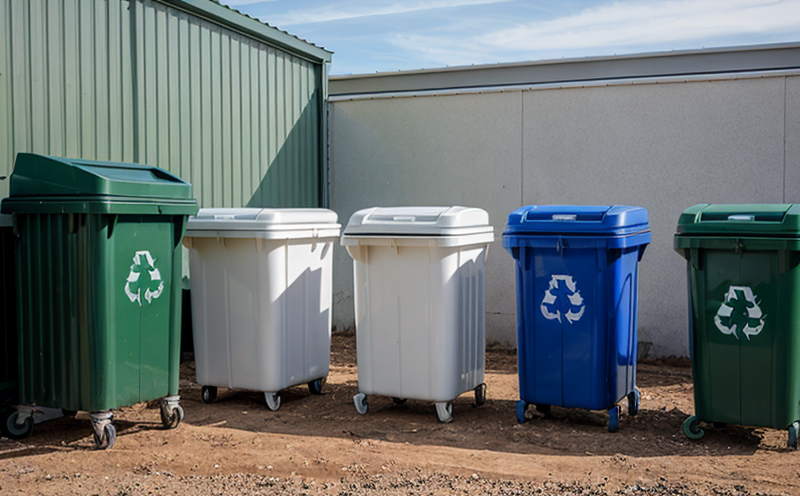ASTM D5988 Soil Biodegradation Test
The ASTM D5988 soil biodegradation test is a critical method used to assess the biodegradability of plastics and other organic materials under controlled conditions. This standard evaluates whether a material can be broken down by microorganisms in soil over time, which is essential for understanding its environmental impact.
This test follows an accelerated composting process that mimics natural decomposition but occurs within laboratory-controlled environments. The primary goal is to determine the extent of biodegradation and identify any potential pollutants released during the breakdown process. This information is vital for industries involved in sustainable packaging development, ensuring products meet stringent environmental standards.
The test begins with careful preparation of specimens, which typically include polymeric samples or blends, as well as other relevant materials such as additives or fillers. Specimens are then placed into soil incubation chambers where they undergo controlled temperature and humidity conditions designed to simulate real-world composting environments. This allows for accelerated degradation testing compared to natural decomposition processes.
At regular intervals throughout the test period, samples are removed from the incubation chambers for analysis. Various analytical techniques may be employed during these inspections, including but not limited to infrared spectroscopy (IR), nuclear magnetic resonance spectroscopy (NMR), and gas chromatography-mass spectrometry (GC-MS). These methods help quantify changes in chemical composition indicative of successful biodegradation.
The results from the ASTM D5988 test provide valuable insights into how effectively different materials will decompose naturally, helping manufacturers make informed decisions about material selection for their products. Compliance with this standard ensures that packaging solutions contribute positively to waste management efforts and support sustainable development goals set forth by international organizations like ISO.
Compliance with ASTM D5988 is increasingly becoming mandatory across various jurisdictions as part of broader sustainability initiatives aimed at reducing landfill contributions from non-biodegradable waste. By adhering to these rigorous testing protocols, companies can demonstrate their commitment to environmental responsibility while also ensuring product performance remains uncompromised.
Understanding the specifics behind ASTM D5988 is crucial for quality managers, compliance officers, R&D engineers, and procurement teams working within packaging industries. These professionals play pivotal roles in driving innovation towards more environmentally friendly solutions. Familiarity with this standard enables them to stay ahead of regulatory changes and market trends related to sustainable practices.
For those looking into implementing ASTM D5988 tests themselves or integrating these requirements into their existing quality assurance frameworks, having reliable third-party laboratories like Eurolab can significantly simplify the process. Our experienced staff will guide you through every step from specimen preparation to final interpretation of results, ensuring accurate and consistent outcomes.
The ASTM D5988 soil biodegradation test remains a cornerstone in evaluating plastic materials' environmental impact. Its role extends beyond mere compliance; it serves as an essential tool for fostering responsible practices within packaging design and manufacturing processes.
Benefits
The implementation of ASTM D5988 soil biodegradation testing offers numerous advantages that contribute to both environmental sustainability and regulatory compliance. By conducting thorough evaluations according to this standard, organizations can:
- Evaluate the extent of biodegradation under controlled conditions.
- Identify potential pollutants released during degradation processes.
- Promote the use of eco-friendly packaging materials that align with global standards.
- Ensure compliance with local and international regulations regarding waste management practices.
- Demonstrate a commitment to sustainable development goals set forth by various stakeholders.
The results derived from ASTM D5988 tests provide valuable data for continuous improvement initiatives aimed at enhancing product performance while minimizing adverse impacts on ecosystems. These insights empower companies to make well-informed decisions regarding material selections and process optimizations, ultimately leading to more responsible business practices.
Eurolab Advantages
When choosing Eurolab for conducting ASTM D5988 soil biodegradation tests, clients benefit from a combination of expertise, advanced facilities, and unwavering commitment to quality assurance. Here’s why partnering with us is advantageous:
- Experienced Staff: Our team comprises highly skilled professionals who possess extensive knowledge in materials science and environmental testing.
- State-of-the-Art Equipment: We utilize cutting-edge instrumentation tailored specifically for ASTM D5988 tests, ensuring precise measurements and accurate results.
- Rigorous Quality Control: Every aspect of our operations adheres to strict quality control measures, guaranteeing consistent and reliable outcomes.
- Comprehensive Reporting: Our detailed reports offer comprehensive analyses backed by robust scientific evidence, facilitating informed decision-making processes.
- Regulatory Expertise: With deep understanding of relevant standards and guidelines, we help clients navigate complex regulatory landscapes effectively.
- Custom Solutions: Tailored services cater specifically to individual client needs, ensuring optimal alignment with specific requirements.
- Global Reach: Leveraging our global network allows for seamless collaboration across borders, supporting multinational operations efficiently.
Partnering with Eurolab ensures that you receive expert guidance throughout the entire testing process, from initial consultation to final report delivery. This comprehensive approach guarantees accurate and actionable insights into your materials' biodegradation capabilities.
Customer Impact and Satisfaction
By partnering with Eurolab for ASTM D5988 soil biodegradation testing services, customers experience a range of positive impacts that enhance their overall satisfaction levels. These benefits extend beyond mere compliance; they encompass broader improvements in operational efficiency, customer trust, and environmental stewardship:
- Enhanced Reputation: Demonstrating adherence to rigorous international standards like ASTM D5988 reflects positively on your company's reputation.
- Improved Product Quality: Thorough evaluations ensure only high-quality materials enter the market, enhancing customer confidence and satisfaction.
- Increased Market Access: Meeting regulatory requirements opens up opportunities for international trade and business expansion.
- Better Decision-Making: Accurate data enables informed decisions regarding material selection and process optimizations, driving continuous improvement efforts.
- Cost Efficiency: Early identification of issues through comprehensive testing reduces long-term costs associated with defective products or non-compliance fines.
- Stakeholder Engagement: Transparent communication about sustainability initiatives fosters stronger relationships with stakeholders, including customers and regulatory bodies.
- Future-Proofing: Staying ahead of emerging trends ensures your organization remains competitive in rapidly evolving markets.
The positive impacts derived from Eurolab's ASTM D5988 services translate into tangible benefits for both internal operations and external relationships, ultimately contributing to long-term success and growth.





